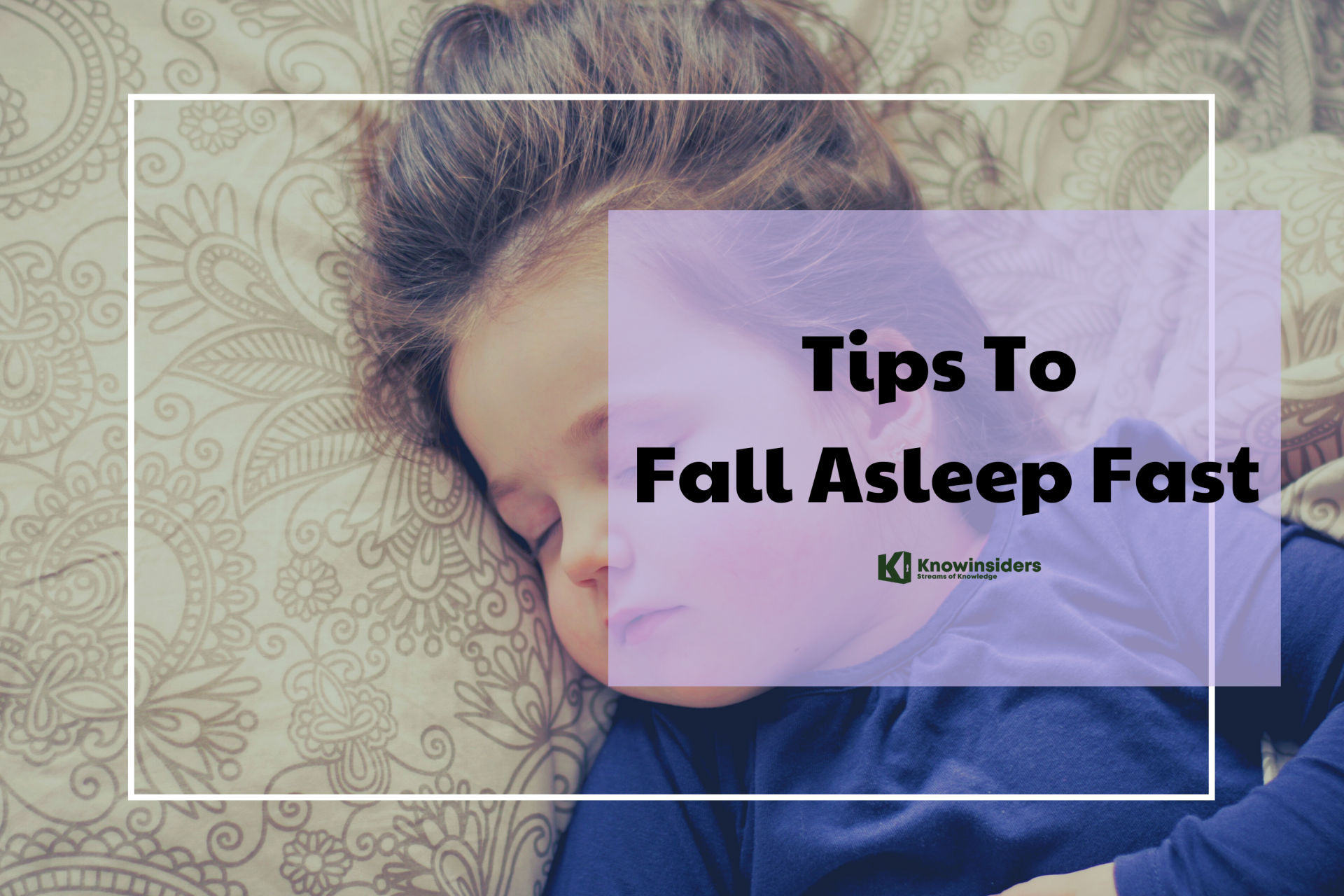Tips to Fall Asleep Fast in 60s or 120s
 |
| Photo: KnowInsiders |
Do you find it hard to get to sleep at night?
Is tossing, turning and not being able to switch off a big annoyance to you as your head hits the pillow?
Sleep deprivation can contribute to a range of long-term health issues, but Dr. Andrew Weil from the University of Arizona believes he has the answer to your night's sleep.
Weil has developed the "4-7-8" technique which he says helps insomniacs overcome sleeplessness.
The doctor says the method is simple and helps the mind slow down and the body relax.
Why Can't You Sleep?
Common causes of chronic insomnia include:
Stress. Concerns about work, school, health, finances or family can keep your mind active at night, making it difficult to sleep. Stressful life events or trauma — such as the death or illness of a loved one, divorce, or a job loss — also may lead to insomnia.
Travel or work schedule. Your circadian rhythms act as an internal clock, guiding such things as your sleep-wake cycle, metabolism and body temperature. Disrupting your body's circadian rhythms can lead to insomnia. Causes include jet lag from traveling across multiple time zones, working a late or early shift, or frequently changing shifts.
Poor sleep habits. Poor sleep habits include an irregular bedtime schedule, naps, stimulating activities before bed, an uncomfortable sleep environment, and using your bed for work, eating or watching TV. Computers, TVs, video games, smartphones or other screens just before bed can interfere with your sleep cycle.
Eating too much late in the evening. Having a light snack before bedtime is OK, but eating too much may cause you to feel physically uncomfortable while lying down. Many people also experience heartburn, a backflow of acid and food from the stomach into the esophagus after eating, which may keep you awake.
Additional common causes of insomnia include:
 |
| Photo: Al Arabiya |
Mental health disorders. Anxiety disorders, such as post-traumatic stress disorder, may disrupt your sleep. Awakening too early can be a sign of depression. Insomnia often occurs with other mental health disorders as well.
Medications. Many prescription drugs can interfere with sleep, such as certain antidepressants and medications for asthma or blood pressure. Many over-the-counter medications — such as some pain medications, allergy and cold medications, and weight-loss products — contain caffeine and other stimulants that can disrupt sleep.
Medical conditions. Examples of conditions linked with insomnia include chronic pain, cancer, diabetes, heart disease, asthma, gastroesophageal reflux disease (GERD), overactive thyroid, Parkinson's disease and Alzheimer's disease.
Sleep-related disorders. Sleep apnea causes you to stop breathing periodically throughout the night, interrupting your sleep. Restless legs syndrome causes unpleasant sensations in your legs and an almost irresistible desire to move them, which may prevent you from falling asleep.
Caffeine, nicotine and alcohol. Coffee, tea, cola and other caffeinated drinks are stimulants. Drinking them in the late afternoon or evening can keep you from falling asleep at night. Nicotine in tobacco products is another stimulant that can interfere with sleep. Alcohol may help you fall asleep, but it prevents deeper stages of sleep and often causes awakening in the middle of the night.
| Sleep is an essential function1 that allows your body and mind to recharge, leaving you refreshed and alert when you wake up. Healthy sleep also helps the body remain healthy and stave off diseases. Without enough sleep, the brain cannot function properly. This can impair your abilities2 to concentrate, think clearly, and process memories. Most adults require between seven and nine hours3 of nightly sleep. Children and teenagers need substantially more sleep, particularly if they are younger than five years of age. Work schedules, day-to-day stressors, a disruptive bedroom environment, and medical conditions can all prevent us from receiving enough sleep. A healthy diet and positive lifestyle habits can help ensure an adequate amount of sleep each night – but for some, chronic lack of sleep may be the first sign of a sleep disorder. |
How To Fall Asleep Fast In Just 60 Seconds (4-7-8 Method)
Before you proceed, sit in a comfortable position with your back straight, and place the tip of your tongue against the tissue behind your upper front teeth. You will be breathing through your mouth and around your tongue. Try and hold all this throughout the entire exercise.
 |
| Photo: Community Counts |
1. Exhale through your mouth and empty your lungs.
2. Inhale quietly through your nose and count to 4.
3. Hold your breath and count to 7.
4. Exhale hard through your mouth, pursing the lips to make a “whoosh sound” and count to 8.
5. Inhale again and then repeat the whole cycle up to 4 times.
Practice this twice a day to start seeing results quicker. Avoid doing more than 4 cycles each time until you’ve got a firmer grasp on the 4-7-8 technique.
'Note that you always inhale quietly through your nose and exhale audibly through your mouth. The tip of your tongue stays in position the whole time,' explains the creator Dr Weils.
How To Fall Asleep Fast In Just 120 Seconds
1. Start with deep breaths
We want to start the relaxation process immediately so breathe deeply, fully and slowly into the belly and chest.
2. Relax the face
We often don’t realize it, but it is normal to tense some muscles in the face for the majority of the day. Work through all the areas of the face, releasing all tension in the facial muscles, neck and jaw.
3. Relax your shoulders
Push your shoulders downwards away from your head as far as possible. Imagine you are reaching to touch your ankles with your hands.
Continue to breathe deeply throughout…
4. Relax your upper body
Starting with your upper arms, then lower arms, move your focus downward switching off every muscle one by one. As you switch off each muscle, focus on relaxing fully and do not move again afterward.
5. Relax your lower body
Moving from your torso, abs, glutes, etc move your focus downwards muscle-by-muscle, switching off every muscle.
6. Visualization
Do one of the following three things until you fall asleep:
-
Imagine yourself lying in black velvet hammock in a pitch-black room;
-
Imagine yourself lying on your back in a canoe on a perfectly still lake;
-
Repeat ‘Don’t think, don’t think in your head (mind you, if you are anxious about falling asleep or an over-thinker, this one might not work for you)
How Much Sleep Do Humans Need?
 |
| Photo: EurekAlert! |
The right amount of sleep largely depends on your age. The National Sleep Foundation recommends the following daily sleep allotment for different age groups.
| Age Group | Age Range | Recommended Amount of Sleep per Day |
|---|---|---|
| Newborn | 0-3 months | 14-17 hours |
| Infant | 4-11 months | 12-15 hours |
| Toddler | 1-2 years | 11-14 hours |
| Preschool | 3-5 years | 10-13 hours |
| School-age | 6-13 years | 9-11 hours |
| Teen | 14-17 years | 8-10 hours |
| Young Adult | 18-25 years | 7-9 hours |
| Adult | 26-64 years | 7-9 hours |
| Older Adult | 65 years or older | 7-8 hours |
How to Prevent Insomnia
Good sleep habits can help prevent insomnia and promote sound sleep:
-
Keep your bedtime and wake time consistent from day to day, including weekends.
-
Stay active — regular activity helps promote a good night's sleep.
-
Check your medications to see if they may contribute to insomnia.
-
Avoid or limit naps.
-
Avoid or limit caffeine and alcohol, and don't use nicotine.
-
Avoid large meals and beverages before bedtime.
-
Make your bedroom comfortable for sleep and only use it for sex or sleep.
-
Create a relaxing bedtime ritual, such as taking a warm bath, reading or listening to soft music.
 How To Stop Snoring: Home Treatment and Doctor's Advice How To Stop Snoring: Home Treatment and Doctor's Advice Snoring can be irritating to loved ones trying to catch some ZZZs. But it can also be a sign of a potentially serious condition. Keep ... |
 Best times to sleep for different age groups Best times to sleep for different age groups Scientific research makes clear that sleep is essential at any age. Sleep powers the mind, restores the body, and fortifies virtually every system in the ... |
 What To Do If You've Got Sleeping Problems Due To Noise? What To Do If You've Got Sleeping Problems Due To Noise? Loud surroundings can be a major disruption to sleep quality and quantity. Sounds can prevent you from drifting off right away or could pull you ... |


























